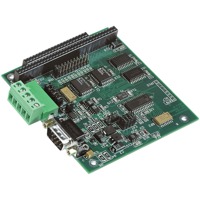CAN104-DN - Interfaces PC/104 Computers to the CAN Network
To broaden the company's base in Controller Area Network (CAN technology), the CAN104 adapter was introduced for 16-bit PC/104™ bus computers, supporting the newer SJA1000 controller. The adapter supports 8-bit transfers and takes advantage of the additional interrupts on the expanded bus.
The Philips SJA1000 CAN stand-alone controller chip provides new degrees of functionality for the CAN104 at a low cost. By not incorporating a co-processor, the CAN104 is a cost-effective and high-performance solution for automotive and industrial applications.
The SJA1000 keeps pace with the industry with its many capabilities— more than its predecessor, the older 82C200. It is backward compatible with the 82C200. The 82C200 is restricted to BasicCAN (11-bit identifiers) while the SJA1000 operates in either BasicCAN or PeliCAN which supports the CAN 2.0B specification (29-bit identifiers). The SJA maintains extended frame passivity while in the BasicCAN mode.
This controller chip is designed with a 16 MHz clock, a larger receive buffer and a better acceptance-filtering — including the ability to extend the acceptance mask to the data field. It has the ability to operate at data rates up to 1 Mbps.
The PeliCAN mode has these features: error counters with read/write access; programmable error warning limit; last error code register; error interrupt for each CAN-bus error; arbitration lost interrupt with detailed bit position; single-shot transmission (no retransmission); listen-only mode (no acknowledge, no active error flags); acceptance-filter extension (4-byte mask); and reception of "own" messages (self-reception request).
The CAN104 adapter incorporates the DeviceNet physical layer with optically-isolated transceiver, reverse-voltage and short-circuit protection. Field connectors include the DeviceNet 5-position open-style and DE-9 as defined by CAN in Automation (CiA).



